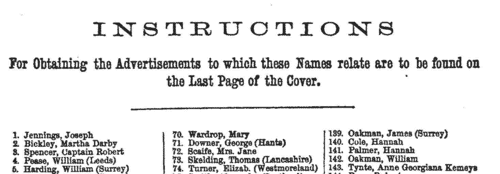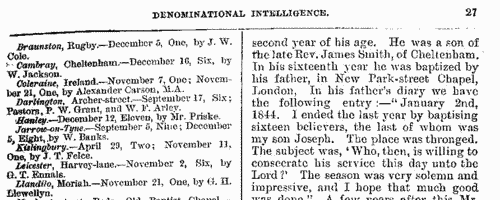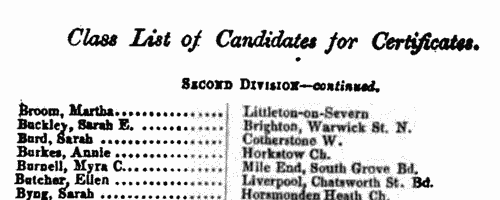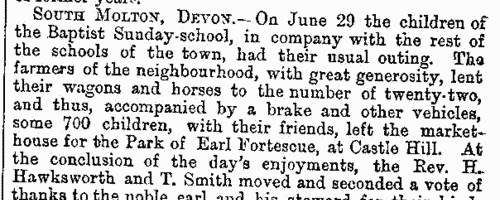Add this eBook to your basket to receive access to all 98 records. Our indexes include entries for the spelling middleditch. In the period you have requested, we have the following 98 records (displaying 51 to 60): These sample scans are from the original record. You will get scans of the full pages or articles where the surname you searched for has been found. Your web browser may prevent the sample windows from opening; in this case please change your browser settings to allow pop-up windows from this site.  Persons of standing recommending London police recruits
(1843-1857) Persons of standing recommending London police recruits
(1843-1857)
The Metropolitan Police Register of Joiners (MEPO 4/334) lists policemen joining the force 1 January 1843 to 1 April 1857 (warrant numbers 19893 to 35804). The register is alphabetical, in so far as the recruits are listed chronologically grouped under first letter of surname. It gives Date of Appointment, Name, Number of Warrant, Cause of Removal from Force (resigned, dismissed, promoted or died), and Date of Removal. Although the register was closed for new entrants at the end of 1842, the details of removals were always recorded, some being twenty or more years later. Those recruits not formerly in the police, the army, or some government department, were required to provide (normally) at least two letters of recommendation from persons of standing, and details of these are entered on the facing pages. Where a recruit was only recently arrived in the metropolis, the names and addresses of the recommenders can be invaluable for tracing where he came from. Those recruits not formerly in the police, the army, or some government department, were required to provide (normally) at least two letters of recommendation from persons of standing, and details of these are entered on the facing pages: the names in these are indexed here (the police recruits are indexed separately and not included here). Recruits transferred from other forces or rejoining the force did not normally need recommendations - in the latter case, former warrant numbers are given - but some recommendations are from police inspectors, even other constables. Recruits coming from the army sometimes have general military certificates of good conduct, but most often have a letter from their former commanding officer; recruits recommended by government departments (most often the Home Office) similarly have letters from the head of department. But the great majority of the names and addresses in these pages are of respectable citizens having some sort of personal acquaintance with the recruit. Where more than two recommendations were provided, the clerk would only record one or two, with the words 'and others'. Tradesmen are sometimes identified as such by their occupations; there are some gentry. Although the bulk of these names are from London and the home counties, a scattering are from further afield throughout Britain and Ireland. | Sample scan, click to enlarge

| Insolvents
(1858)
Insolvency notices for England and Wales: insolvency often caused people to restart their lives elsewhere, so these are an important source for lost links | Sample scan, click to enlarge

|  Sailors and marines on board Her Majesty's ship Highflyer
(1856-1860) Sailors and marines on board Her Majesty's ship Highflyer
(1856-1860)
The China Medal was awarded to soldiers and sailors involved in the various actions of the war against China, in which this ship was engaged from 1856 to 1860. The medals were either delivered on board or sent on in 1862: except that many of the men were no longer immediately traceable, and the remarks on the roll show that some medals were not sent on for several years, and some were never sent. After the main roll there is a section showing which of the men also qualified for clasps. Separate clasps were awarded for men who had been in receipt of the China Medal of 1842; for the taking of Fatshan in 1857, Canton in 1857, Taku Forts in 1858, Taku Forts in 1860, and Pekin in 1860. Most of the men on this ship are shown as having been given the Canton clasp, for being actually present at Canton on 28 and 29 December 1857, when that city was bombarded and finally captured. | Sample scan, click to enlarge

| Unclaimed Money and Property
(1864)
Gun & Co. of 17 Charlotte Street, London, published this 'List of Next of Kin & Heirs, &c., who have been Advertised for in the English, Irish, Scotch, United States of America, Canadian, Australian, East and West Indian, and other Newspapers, since 1704. Money & Property to the value of many Millions Sterling want Claimants'. The list of 4076 names gives surname, christian name, and, occasionally, locality. Copies of the actual advertisements were furnished to enquirers by the company at a cost of six shillings. | Sample scan, click to enlarge

| Inhabitants of Blockley in Worcestershire
(1868)
Gentry, farmers and traders listed in J. E. R. Kelly's Post Office Directory of Worcestershire. (The sample scan is of the section for the little parish of Hadzor) | Sample scan, click to enlarge

|  Men of the 43rd Regiment who fought in the New Zealand War
(1866-1870) Men of the 43rd Regiment who fought in the New Zealand War
(1866-1870)
New Zealand War Medal roll for the 43rd (Monmouthshire Light Infantry) Regiment of Foot: for service in the New Zealand campaign 1866 to 1867: the rolls were compiled following a general order in 1869 and the medals were distributed in 1870. The regiment had been serving in India, and was moved to New Zealand in 1866; the men returned to England in 1868. | Sample scan, click to enlarge

| Baptists
(1870)
The Baptist Messenger was produced monthly. The material indexed is mainly the Denominational Intelligence, i. e. the doings of the Baptist churches in Britain and Ireland, including summary lists of baptisms naming only the ministers. There are also some Baptist obituaries, and lists of donations to the Pastors' College at the Metropolitan Tabernacle in London. | Sample scan, click to enlarge

| Baptists
(1871)
The Baptist Messenger was produced monthly. The material indexed is mainly the Denominational Intelligence, i. e. the doings of the Baptist churches in Britain and Ireland, including summary lists of baptisms naming only the ministers. There are also some Baptist obituaries, and lists of donations to the Pastors' College at the Metropolitan Tabernacle in London. | Sample scan, click to enlarge

| Trainee Schoolmasters at Peterborough
(1875)
The Education Department set examinations of trainee teachers at the various training colleges in Britain. This is the class list of the men who took examinations at Peterborough Teacher Training College at Christmas 1875. The names are given for the second year first, arranged by division in the examination (in order of merit for the first and second divisions), and then for the students of the first year, arranged similarly. Full names are given (with initials for middle names). The letter (D.) indicates that the candidate had obtained a certificate of competency as a teacher of drawing. (The sample scan is from a general class list for schoolmistresses) | Sample scan, click to enlarge

| Baptists
(1876)
The Baptist was a weekly newspaper, with some general news and political coverage, but mainly devoted to chronicling Denominational Intelligence, i. e. the doings of the Baptist churches in Britain and Ireland. July to December 1876. | Sample scan, click to enlarge

|
Research your ancestry, family history, genealogy and one-name study by direct access to original records and archives indexed by surname.
|












